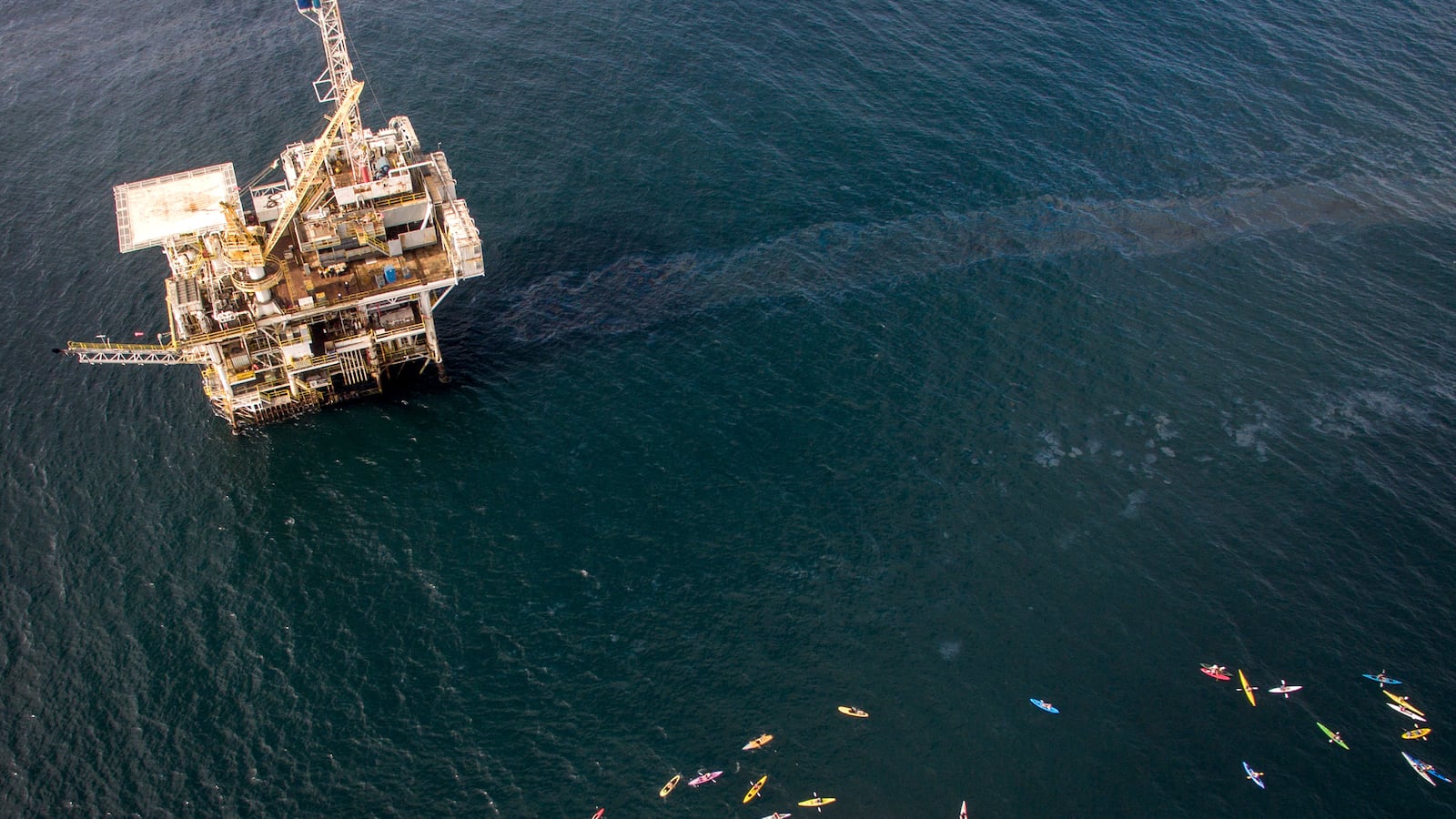OFF SANTA BARBARA, California — It’s a beautiful morning, the sun just starting to burn through the coast’s signature foggy haze. A northerly wind follows line after line of rolling Pacific swells, yet it’s not quite enough to push away the heavy smell of gasoline that hangs in the air. Thirty or so stalwart folks are paddling their way toward the looming erector set of an oil platform around three miles out, a mixed bag of kayaks, surfboards, and stand-up paddlers.
The flotilla is made up of locals with a passion for the ocean and a strong distaste for what they say is too little being done to protect it, especially in the wake of May’s oil spill, which soaked the very coast they just left behind with 140,000 gallons of black goop when a pipeline without an automatic shutoff valve burst. Organized by the Surfrider Foundation, their goal is to unfurl a 70-foot-long floating banner that reads #CrudeAwakening, a play on words they hope to launch into the Internet’s collective subconscious enough to muster support for four bills that are making their way through the California state assembly that would, if enacted, greatly increase the level of environmental protection afforded the state’s iconic coastline.
“While we all remain dependent on fossil fuels, we don’t need more reckless offshore drilling,” says Adam Fetcher, director of global PR and communications for eco-minded outdoor gear maker Patagonia, which is one of the protest’s organizers, and whose corporate offices are just a few miles away. “The recent oil spill here in our own backyard was awful, but we believe environmental disasters can move our society in the right direction—toward renewable alternatives, and safer ways of producing oil and gas in the interim. Offshore oil production is just too risky—oil spills are simply inevitable.”
Specifically, bills SB788, SB414, AB864 and SB295 would close a loophole that allows new drilling in a designated Marine Protected Area, establish a mandatory team of trained seamen to act as emergency responders to any spills, require companies to use the “best available technology” on pipelines, and improve inspection requirements.
As the paddlers’ navy finally arrives at the platform, which is named Holly and is reportedly offline, they gather around a support boat, while hundreds of feet above them oil workers blast an air horn and take photographs. On the rig’s massive girders, dozens of seals bark back, some slipping into the ocean, which is iridescent with the telltale surface rainbow of oil. The captain of the boat that I’m on notes that since there is such an abundance of oil beneath the ocean’s surface, a certain level of natural seepage always occurs.
It won’t be until hours later, when we’re back on shore and reviewing images from a drone high overhead, that we notice the thickly colored rainbow stream flowing like a river atop the ocean’s current appears to originate precisely from the platform.
The paddlers’ message is made all the more poignant by the federal government’s opening up of Alaskan waters to drilling just last week, a move that many environmentalists say is a Pandora’s Box of potential disaster. It’s hard not to immediately recall the BP Deepwater Horizon spill that crushed ecosystems, and livelihoods, in the Gulf of Mexico in 2010.
Those grim images aside, this particular event wasn’t intended as a divisive action, or a middle finger at the oil companies, but instead a call to action to the people of California.
“Basically, it was all about good times on the high seas for a good cause. It’s not every day that you can work to address the petroleum problem we all are facing in a way that is fair and decent and logical to pro-oil and anti-oil interests alike,” said Ethan Stewart, a local writer and editor who took part in the paddle. “In the wake of the Refugio spill this past spring, there are four state senate bills being proposed that do just that. They pass the common-sense test no matter your political lean.”
The recent spill aside, California itself is of particular note in the fight against climate change, with the state being at ground zero for the sort of environmental fallout climate scientists have been warning about. Scientists say its historic drought has been exacerbated by as much as 20 percent due to the effects of climate change, which itself is driven in part by fossil fuels.
Spreading out a bit, the protesters unravel their piece de resistance—the #CrudeAwakening banner’s impressive expanse miniaturized by the industrial complex above. With the whine of an amplified mosquito, a camera drone flies up and captures images of the scene while a Coast Guard boat, which came along as the outing’s chaperone, buzzes a little closer. Federal regulations, the paddlers have been warned, require that they get no closer than 150 feet from the platform. Point made and photos snapped, they roll the banner back up and paddle against the current back to shore.
“I was here when the spill happened, and I was shocked that that still happens, and that there can be that much pressure and that much can come out without anyone knowing right away,” notes John Phaneuf, one of the event’s organizers and a local surfer. “This was not an anti-oil-platform protest; we’re very clear on the importance of oil in our lives. However, it doesn’t need to be in our oceans.”
His bleak tone is punctuated all the more as another event organizer, Surfrider's California Policy Manager Stefanie Sekich-Quinn, and I walk up Haskell’s Beach, the staging area for the event, and she points out the long, black scumline that stretches as far as the eye can see in either direction. Chunks of goopy crude, in the form of tar balls, are unnoticed by the children playing catch with their father right on top of it, even though they cling like pine sap to my sandals when stepped on. She’s quick to point out that, again, some natural seepage will wash ashore, but also adds that this seems like an extreme example of it if that’s the case.
Extreme, but perhaps not unprecedented. Just a few weeks ago, a miles-long slick was discovered a thousand yards from the shore we’re standing on, raising hackles among environmentalists and prompting an investigation by the Coast Guard, which attributed it to natural causes. Then again, neighboring town Summerland indefinitely closed one of its beaches just days ago due to an overabundance of tar balls from an as-yet unidentified source.
It’s just another event in a decades-long struggle over the fate of the California coast, one that those gathered here hope to rally their peers to help protect.
“The paddle to the platform was a fun and poetically appropriate way to raise awareness about these bills,” Stewart says. “This is a unique opportunity to be able to take a step or two in the right direction toward reconciling our oil addictions here in California, and people should know about it.”






